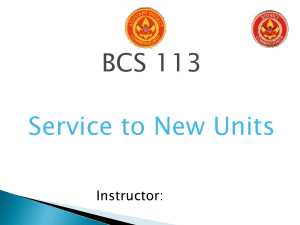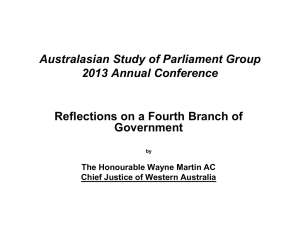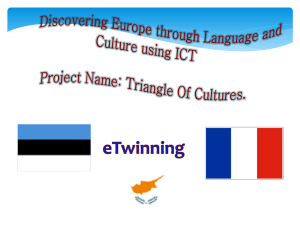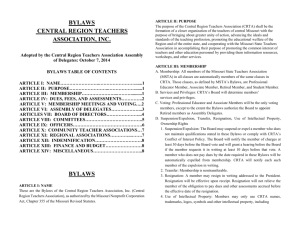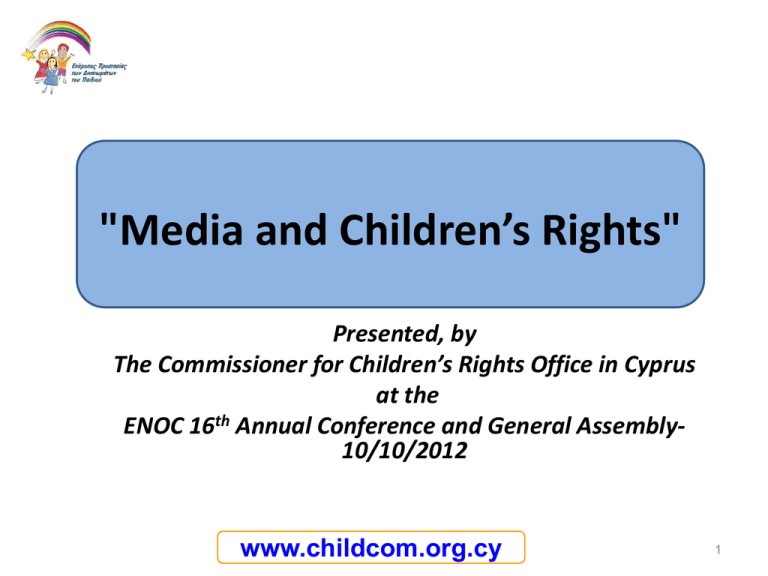
"Media and Children’s Rights"
Presented, by
The Commissioner for Children’s Rights Office in Cyprus
at the
ENOC 16th Annual Conference and General Assembly10/10/2012
www.childcom.org.cy
1
Introduction
• The media have a significant impact on the lives of modern
children. Through the Media, children adopt behaviors, attitudes
and values that influence the development of their personality.
•The interaction of children with the Media is diverse and
multidimensional: children as spectators, as subjects of news
television or print, or children participating in entertainment
programs.
•Children's rights in the Media sector is an important and sensitive
issue and there are therefore enormous responsibilities, imposed
to the Commissioner for the Protection of the Rights of the Child
and the adult society, to protect and safeguard them.
www.childcom.org.cy
2
Actions by the Commissioner
Actions aiming to raise awareness and sensitize the public and
the media professionals in respect of children’s rights:
A. Interventions and/or Public Positions
(to TV stations, printed media, the Cyprus Media Complaints
Commission , the Commissioner for Personal Data Protection
and the Cyprus RadioTelevision Authority)
B. Cooperation with the Cyprus RadioTelevision Authority
C. Publications
D. Hosting working dinner for journalists
www.childcom.org.cy
3
A. Interventions and/or Public Positions
Public position regarding :
•the way the Media reported anti-social behavior by students in school premises.
•the way a child was presented by the Media and especially the television news
within a fundraising aiming to cover the costs of her treatment.
•a child holding a leading role in a TV series, which included scenes of psychological,
physical and sexual violence.
•the way the Media reported the case of a child who ended his life.
Interventions:
• to the Cyprus Media Complaints Commission and the Commissioner for Personal
Data Protection regarding reports that the Commissioner believed revealed
children’s personal information in violation of their privacy and dignity.
•to the Cyprus RadioTelevision Authority regarding the appropriateness of TV
programs and shows.
www.childcom.org.cy
4
B. Cooperation with the Cyprus RadioTelevision Authority
•The CRTA, received a complaint regarding the specific way that the television
news programs covered, incidents of sexual abuse of minors by a 38year-old man.
The CRTA asked the Commissioner’s view on the protection of children's rights
on the issue, and the criteria on which to evaluate, the way each station handled
that news.
•In view of this, the Commissioner prepared a document with her positions
regarding the Media and the Child Spectator, which can serve as a guide in
evaluating the presentation of news from each station. The document was sent
to CRTA and posted on the Commissioner’s website.
•The CRTA responded positively to the Commissioners’ position and decided to
send the document to all television stations.
•The CRTA asked for the Commissioner’s recommendations on the bill entitled
“The Law amending the Radio and Television Laws of 1998 to 2011” regarding the
provisions concerning children.
www.childcom.org.cy
5
C. Publications
1. Issuing of “The Commissioner’s Position on the Rights
of the Child, Media and the Child Spectator”
2. Republication in Cyprus of the UNICEF Guide for
Journalists “The media and Children’s Rights”
www.childcom.org.cy
6
1. Issuing of "The Commissioner’s Position on the Rights of the
Child, Media and the Child Spectator”
The document, includes:
•Articles of the Convention on the Rights of the Child relating directly or
indirectly to the media.
•Description of the main findings on the negative effects on children from
watching violence in entertainment and news television programs.
•Conclusions regarding the presentation of violent topics in the news, in
order to limit their adverse effects on children.
•Suggestions regarding the role of professionals in the Media to protect
children.
•Checklist on how to evaluate reports in the Media regarding child abuse
cases.
The document can serve as a guide in evaluating the presentation of
news from each station.
www.childcom.org.cy
7
2. Republication in Cyprus of the UNICEF Guide for
Journalists “The media and Children’s Rights”
•The development of this Guide was commissioned by UNICEF in
1999, as part of the 10 years celebrations since the adoption of
the UN Convention on the Rights of the Child, to the organization
for media ethics MediaWise.
•The Guide was translated and published in Greek in 2009 on the
initiative of the Greek National Committee for UNICEF, which
granted the right to the Commissioner to issue the Guide in
Cyprus.
•The objective of this guide is to help journalists working on
issues concerning children understand the rights of the child and
the importance of protecting these rights in the context of their
professional activities.
www.childcom.org.cy
8
This guide is an excellent tool for every professional
working in the Media because it provides:
•knowledge about the protection of children's rights
based on the provisions of the Convention on the Rights
of the Child
•ideas on issues relating to children
•guidelines and practical recommendations, whose
implementation will contribute to creating a culture of
respect for children's rights in the media sector and in
the society.
www.childcom.org.cy
9
D. Hosting working dinner for journalists
The Commissioner hosted a working dinner for journalists in
which she presented the Guide for Journalists of UNICEF «The
Media and Children's Rights" and stressed the need for
implementation.
www.childcom.org.cy
10







